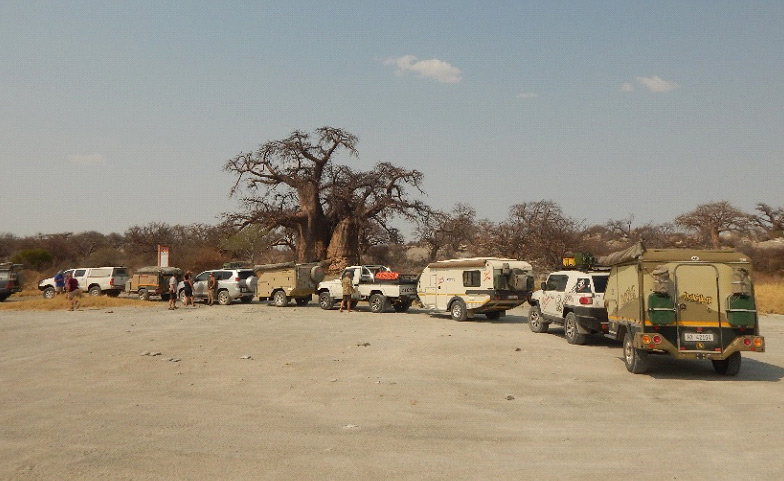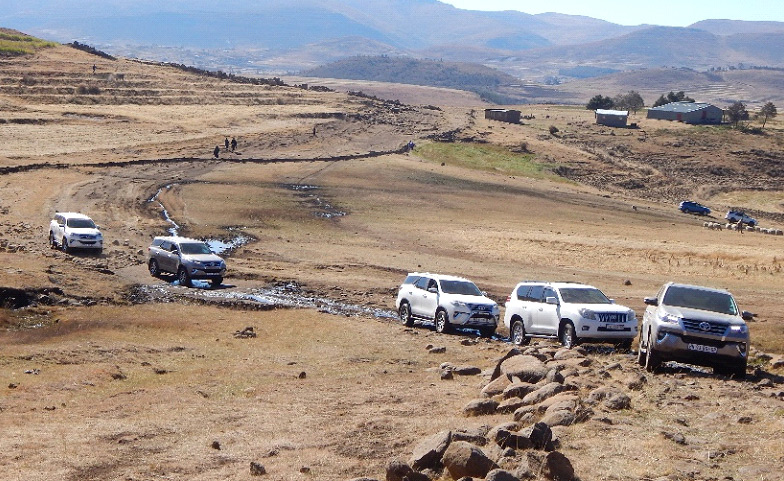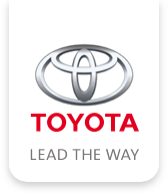TO TOW OR NOT TO TOW

Like most things in life, there are pro’s and con’s to just about everything that we do. Towing an off-road trailer on an overland safari is no exception, there are plenty of arguments for both sides. There are basically three options to the overlanding camping experience, a ground tent, a roof top tent or towing an off-road trailer.
As a one -time confirmed ground tent man, I thought, why tow, just so much more to go wrong and worry about. That was up until a few years back, now I’m a confirmed tower. Some areas, such as the Lesotho Mountain Kingdom, or the dunes of Namibia are an exception to the rule when it comes to towing, but not every trip takes us to those radical destinations. The places where you can tow out -weigh the places where you cannot tow. I began slowly, first just an off-road box trailer for carrying equipment, then after a few mods, to my trailer, with a roof top tent fitted. From there it was a shift up to a pukka off-road camper van where the sleeping quarters un folds above the tow hitch and the kitchen is on the outside of the van on the left side. It comes complete with a fridge, stove, water tank and ample packing space. Fully laden, the van probably weighs around a ton. I tow an Imagine Trailvan.
So what are the pros of towing versus a ground or roof top tent, there are many.
Firstly, its space. Virtually everything that you will need for a trip should fit into the trailer or van. If you have a family this really eases up the space problem enormously. One of the biggest consumers of space is your bedding and mattress, especially in the cooler months when blankets become vital. Then there’s the fridge, food stuffs, and plates with pots and pans. This all takes up loads of space and you haven’t yet pack in your clothing and tables and chairs, stove and gas bottles. With a trailer, this all goes inside the van and everything in its place. Stop on the side of the road for lunch, you simply open op the right compartments, no unpacking boxes and looking for a place to put them. The same thing when arriving at camp. No need to unpack everything and then pack it away before you turn in for the night, especially if you are in a game reserve. It’s also a whole lot quicker to open the trailer sleeping area vs putting a tent up and placing all the bedding. Packing up is the same thing, far quicker with a trailer.
What about firewood and charcoal, if you are towing, this can go in the vehicle, you simply have just so many more options with a trailer. The weather is not always on our side either, especially when it comes to setting up camp in the rain, or packing up a wet tent with a possible muddy ground sheet, no fun at all.
It all comes down to simply making life a whole lot easier and more straight forward when it comes to packing, unpacking, and the use of its accessible kitchen, fridge and stove. The gas cooker is in an easy to access place, right next to the kitchen and at waist level, or perhaps a bit higher. Water on tap and of course the fridge being right there too. No need to live out of a suitcase either, there are shelves and storage facilities inside the van for everything. The bed has a thick hi density double bed mattress with reading light in just the right place. It really is comfortable and in my mind a massive step up from the tent.
I don’t want to say the biggest drawback is towing it to the campsite, because in need not be.
Firstly, and just like any motor vehicle, it has moving parts which require regular servicing, and this should not be overlooked. I have worked on many trailer wheel bearings over the years, and why, because they are neglected. Regular servicing is vital, the trailer takes a pounding behind the vehicle and the shock load on the bearings, axle and suspension is massive. Preventative maintenance can’t be stressed enough. Take a trip through Botswana, there are many roads and tracks that will have the trailers wheels up in the air on numerous occasions, and they always come down with a thud. This puts tremendous strain on the bearings, axle and suspension. If the van is serviced regularly, you will have great peace of mind on the trip and should something be on its way out, the mechanic should pick it up before you venture off on your trip.
The next thing that many trailer owners don’t seem to take into consideration is the weight on the tow hitch. When lowering the tow hitch onto the tow ball of the vehicle, it should have a resting weight of between 80 and 100kgs. The law actually states that it may not exceed more than 100kgs.
Over weight on the tow hitch can lead to things such as trailer sway, poor vehicle handling and under steer on the vehicles front wheels. The trailer needs to be well packed, with keeping this in mind with the weight distribution. All too often it’s the trailer design which encourages the front end to be over loaded by having perhaps too much packing space up front. If you get the basics right then the rest is easy.
Towing a trailer does take a bit of getting used to but once you have mastered it, it should be a stress free trip all the way, in fact you will probably enjoy it. I find that driving through the bush, I may well take a different line in some areas than if I was not towing. One needs to read the route carefully and anticipate which line the trailers wheels will be taking. Some bumps that I would not even think about avoiding in a non- towing vehicle, I may well try and avoid whilst I’m towing. It’s all about looking for a smoother ride for the trailer and its wheels. If you get this right, your towing speed need not be much less then when not towing. Driving through soft sand requires good concentration, you need to see the soft sandy area coming up and make sure that you have enough momentum to get you through. The trailer does act as a big brake at the back and you need to overcome this. Tyre pressure is vital when towing, deflate the tyres to a little less than the vehicles tyres. The trailer needs flotation over the sand or mud.
One of my biggest fears when it comes to towing, is coming around a corner or through the bush and there’s a big mean Elly waiting for you. If the bush is thick you can’t simply drive off to one side and whether the sand is soft or not, reversing at speed is not always an option. Towing has given me a great respect for the Elephants and at the same time the ability to handle them without causing harm to either of us.
When towing, the concentration levels do need to rise somewhat but at the end of the day, it’s all part of the experience and well worth the added comfort in the bush.
Towing will naturally increase the vehicles fuel consumption but by sensible driving it should not raise the consumption by much, perhaps 2 to 3 litres per 100km, it is a price that you will pay for the added comfort on your trip.
Vehicle following distances should be taken into account whilst towing, a towing vehicle is not going to stop in an emergency as quickly as a non towing vehicle. Depending on the trailer, it may have a brake, but even so it requires extra caution when towing. It’s all about that extra weight that pushes from behind in an emergency.
There are yearly license fees to be paid, and unless you do it yourself, the servicing and maintenance fees.

When travelling in a convoy, I usually hold my speed to around 115km/hour. This brings down everyone’s concentration span by quite a bit and at the same time for those towing, it does make life a little easier. With the modern 4x4 engines, there is no longer any noticeable handicap when towing. Vehicles are able to keep up with the convoy be it on the tar or dirt roads, provided you are travelling at reasonable speeds.
On the overland trips which I take I usually have an almost even spread between towing and non- towing vehicles. I have had to carry out a few running repairs on the trailers over the years but mostly things that are fairly easily repaired.
If you are thinking about towing, go for it, you’ll enjoy the added comfort factor each time you use it.




